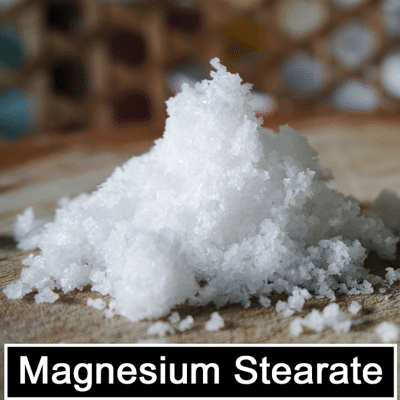Is Magnesium Stearate Dangerous?
As a consumer, the conflicting information available can be confusing and frustrating – we totally get it.
Today, consumers have more information at their fingertips than ever before. This means there is a mountain of potential data to sift through in order to separate the fact from fiction.
One such case that has been clouded in confusion is with magnesium stearate.
Magnesium stearate is often added to foods and supplements because it prevents them from sticking together.
It’s considered a flow agent that manufacturers use to make processing run faster, more smoothly and guarantees that the correct formulation is in each capsule.
Magnesium stearate also prevents breakdown of medications and so absorption occurs later in the digestive tract.
Overall, it would be very difficult for supplement companies to make their products without magnesium stearate and you’d be hard-pressed to find anything in pill form that doesn’t contain magnesium stearate.
All too often, mainstream media confuses chemical names when there are two similar substances.
This is understandable because chemical names can be confusing and easily misrepresented.
However, confusing chemical names can lead to misleading information, widespread claims, and misrepresentations of studies or facts.
When it comes to magnesium stearate, there have been a number of claims that declare it’s unsafe due to studies on chemicals with similar names.
Overall, magnesium stearate has been declared safe by the FDA and is used widely across all food manufacturing markets.
Though it’s critical to always maintain an unbiased view of these claims in order to fully see the big picture and make sure we’re being as safe as possible.
Magnesium Stearate is Widely Used
Magnesium stearate is perhaps one of the most widely used additives in supplements and drugs. In fact, it would be pretty difficult to find a supplement or a drug that doesn’t have magnesium stearate in it.
With all the available information today, it’s important that we maintain a practical and balanced view of all the different studies available.
So, where do these claims come from in the first place? Surely people can’t be making blatant false statements about magnesium stearate?
The gist of the confusion is this, magnesium stearate is safe especially because it’s used in such small doses.
However, if you were to take large doses it could have side effects, mostly laxative in nature.
Additionally, in all situations where there have been side effects reported from taking magnesium stearate, the levels have been used in such high doses it would be near impossible for you to consume.
Unless you were to get your hands on magnesium stearate in its pure form, you would never consume such a high quantity.
Let’s break this down to see where the controversy started and if it holds any weight.
What is Magnesium Stearate?
Magnesium stearate is a fine white powder, made up of two stearic acids plus magnesium.
Stearic acid is naturally found in foods such as:
- flaxseeds
- lard
- butter
- cocoa butter
Stearic acid is considered one of the elements that gives fatty food is characteristic flavors. Also, magnesium is an important mineral that’s needed throughout the body for hundreds of mechanisms.
These two substances are considered safe within the body.
However, we don’t want to make the same mistake so many before us have made and claim that magnesium and stearic acid are the same thing as magnesium stearate.
Misrepresenting these two elements as magnesium stearate itself is exactly the sort of confusion that’s fueled the magnesium stearate debate in the first place.
So, it’s important when you look at the studies to know that even though these are the two components that make it magnesium stearate, they are in fact different substances.
The Studies Behind the Claims That Magnesium Stearate is Dangerous
The predominant claim that’s used against magnesium stearate is that it can harm your body’s T cells. Your T cells are an important part of your immune system, so obviously this is concerning.
But the study that’s used to support this claim is misleading.
This 1990 study is called the “Molecular Basis for Immunosuppressive Action of Stearic Acid on T Cells.”
First of all, the amount of stearic acid that is used is in much larger quantities than any person would take, unless they took it by the spoonful.
On top of this, magnesium stearate and stearic acid are not the same thing. It’s referring to only a component of magnesium stearate, which is misleading itself.
A second study that is often cited because it suggests that magnesium stearate influences your body’s ability to absorb nutrients.
This 1985 study examines a drug called crospovidone and how it dissolves in water.
However, the way the study is set up is by no means a good comparison for what our digestive system looks like. Our digestive system is ultra complex and includes both water soluble and fat soluble elements.
This is a very misleading study that’s been extrapolated out to be more than it actually examines.
In one study that used actual magnesium stearate over three months on rats, found the following results:
- The group who took the highest rate – 20 percent of their entire diet – experienced decreases weight gain, reduces liver weight, calcium deposits in the kidneys, kidney stones.
- The rats that ate magnesium stearate where it was 10 percent of their diet only saw a reduced liver weight.
- The group that consumed zero to five percent magnesium stearate of their diet had no side effects at all.
The group who took 20 percent of magnesium stearate were the ones who had the most significant health effects, but 20 percent of your diet would be an absurd amount of magnesium stearate to consume.
Are There Any Risks to Taking Magnesium Stearate?
After careful examination of the appropriate studies regarding magnesium stearate, there are only two real concerns with taking too much magnesium stearate.
First, taking too much magnesium stearate can cause a laxative effect. Second, magnesium stearate can be a problem if you are allergic, which is very rare.
Currently, the Food and Drug Administration allows magnesium stearate in supplements and food. Furthermore, the National Center for Biotechnology Information says anything less than 2500 mg per kilogram per day is considered safe.
But again we’re talking about levels no one would normally consume.
Just to put that in perspective, that would be 113,300mg for every hundred pounds someone weighed.
We understand the concerns and where they originated, but the claims that magnesium stearate is harmful is largely misleading.
As long as you get your supplements from a highly reputable source, you should have little to worry about when it comes to magnesium stearate.


I read the article, and really hoping it is the way it really is, thank you
Hi Steven,
Thank you for your feedback and thank you for reading our article.
Best wishes,
Team Atrantil
All I know is, my severe gastrointestinal discomfort went away when I stopped taking pills and switched to gummies, liquid and capsules free of magnesium stearate.
Hi Ida,
Thank you for contacting us. To date, there has been no research supporting the claim that magnesium stearate is dangerous. However, we have no doubts that your sever discomfort went away after stopping all your pills. One of the top concerns in the supplement industry is what is put into supplement capsules. A lot of companies put in ingredients that are not listed on the supplement’s label and there have even been tests that showed supplements which claim to be natural containing synthetic drugs. That is why it is SO important to know exactly what is in your supplements. At Atrantil we are held to the highest standard of supplement testing and are NSF certified for Sport. This means that you can be sure that what is listed on our label is Exactly what is in the capsule. We recommend only taking supplement that have the NSF logo, so that you can be sure of what you are taking.
The risk is too big not to. To find out more check out our blog here.
Best wishes.
Team Atrantil